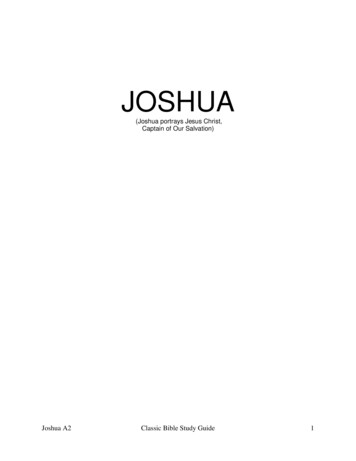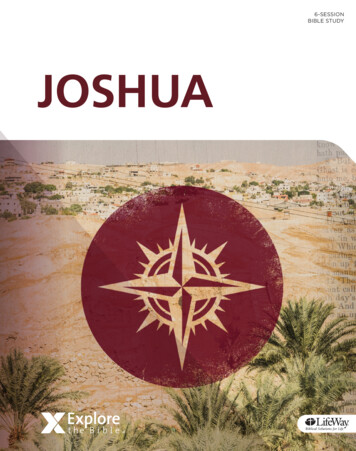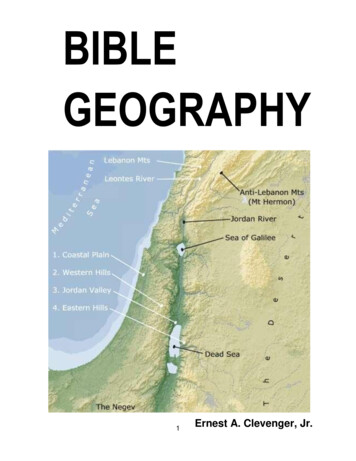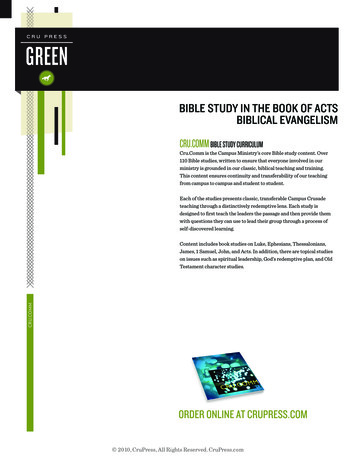
Transcription
JOSHUA(Joshua portrays Jesus Christ,Captain of Our Salvation)Joshua A2Classic Bible Study Guide1
INTRODUCTIONThe book of Joshua records one of the most interesting and important portions of Israel’s history. It informsof the period of their statement as a nation, of which Genesis was prophetic and the rest of the Pentateuchimmediately reparatory. The books of Moses would be imperfect without this one; as it is the capstone ofthem, so it is the foundation of those which follow. Omit Joshua and there is a gap left in the sacred historywhich nothing could supply. Without it what precedes would be incomprehensible and what followsunexplained. The sacred writer was directed to fill that gap by narrating the conquest and apportionment of thepromised land. Thus this book may be contemplated from two distinct but closely related standpoints: first asthe end of Israel’s trials and wanderings in the wilderness, and second as the beginning of their new life in theland. It is that twofold viewpoint which supplies the clue to its spiritual interpretation, as it alone solves theproblem which so many have found puzzling in this book.As the inheritance which the Lord appointed, promised and gave to Israel, Canaan has rightly beenregarded as a type (foreshadow) of Heaven, unto which the Church is journeying through this wildernessworld. But Canaan was the scene of fierce battles, and that presents a serious difficulty unto many, though itshould not. They point out that Heaven will not be the place of fighting, but of eternal rest and felicity, and thenask, How could Israel's history in Canaan prefigure our experience on High? It did not, but it strikingly andaccurately foreshadowed what Christians must accomplish if they are to enter and enjoy "the purchasedpossession". The book of Joshua not only exhibits the sovereign grace of God, His covenant-faithfulness, Hismighty power put forth on behalf of His people, but it also reveals what was required from them in thedischarge of their responsibility: formidable obstacles had to be surmounted, a protracted warfare had to beengaged in, fierce foes overcome, before they entered into the actual enjoyment of the land.If our conception of what constitutes a Christian or the character of the Christian life be altogether lopsided, little wonder that we have difficulty in rightly applying to ourselves the contents of that book whichtypically contains so much important instruction for us. If we will confine our viewpoint solely unto thesovereign grace of God in connection with our salvation, and deliberately close our eyes to all that Scriptureteaches upon the discharge of our responsibility in relation thereto, then it would indeed be strange if weapprehended how that on the one hand Canaan was a free gift unto Israel, which they entered by grace alone;and on the other, that they had to fight for every inch of it! But when we realize that "eternal life" is both the giftof God (Rom. 6:23) and a "crown" which has to be won by faithfulness (Rev. 2:10), that the Christianinheritance is not only purchased by the blood of the Lamb, but is also the "reward" of those who "serve theLord Christ" (Col. 3: 24), then we should have no trouble in perceiving how the type (foreshadow) answers tothe antitype (that which was foreshadowed).They entered and took possession of Canaan by immediate command from God, who has an absoluteright to interfere in human affairs as He pleases. Moreover, it was in the exercise of His righteousness (as wellas of His sovereignty) that God now took from the Canaanites the land which they had forfeited by their sins,and by His grace gave to Israel with the distinct understanding that they, too, would be deprived of it if theyproved unfaithful and disobedient stewards.But why should God give instructions for the utter destruction of the Canaanites? Because of their horribledepravity and gross idolatry; let the reader turn to Lev. 18:3, 27, 28 and then see the verses between 3 and 27for a description of those “abominations,” and also remember God did not act in judgment upon them until “theiniquity of the Amorites” had come to the “full” (Gen. 15:16). God now glorified His justice by destroying thosewho refused to glorify Him by a willing obedience. Israel acted not under the impulse of a lust of conquest butas the executioners of Divine wrath—just as the flood, the pestilence, the earthquake are commissioned byHim to cut off those who provoke His holiness. When He is pleased to do so, He makes use of men as Hisinstruments, rather than the elements. “The Assyrian” was the rod of God’s anger to cut off nations, though heknew not he was being so employed (Isa. 10:5-7). Why then might He not use an elect and godly nation as theconscious instrument of His just vengeance!(Gleanings in Joshua, A. W. Pink)Joshua A2Classic Bible Study Guide2
Joshua 1:1-9"Have not I commanded thee? Be strong and of a good courage: be not afraid, neither be thou dismayed,for the Lord thy God is with thee whithersoever thou goest" (Josh. 1:9). This was the concluding part of thecharge which Jehovah there laid upon His servant. For the third time Joshua was bidden to be courageous.The natural inference to draw from such repetition would be that he was a timid and cowardly man; but hisprevious record effectively disposes of such a conclusion. He was one of the twelve selected by Moses to spyout the Land. In his bold dissent from the gloomy report of ten of his fellows, and in his fighting of Amalek (Ex.17) he had manifested himself as one possessed of valor. Yet God saw fit to press this injunction upon himrepeatedly: as Matthew Henry pointed out, "Those that have grace, have need to be called upon again andagain to exercise grace and improve it". Though that precept did not imply that Joshua was faint-hearted, it didimport he would be faced with situations which called for the exercise of sterling qualities.But let it be pointed out that there is a moral courage, as well as a physical, and not all possessing thelatter are endowed with the former. How many who flinched not in the face of the enemy’s fire, were afraid tobe seen reading God’s Word! There is also strength of mind and will, which refuses to be daunted bydifficulties and dismayed by failures. Let it also be noted that that threefold call to act valiantly was not a mererepetition. In verse 6 Joshua was bidden to be strong and of a good courage in view of the task before him—which demanded physical prowess. In verse 7 it was an injunction unto personal and moral courage: "thatthou mayest observe to do according to all the Law"—to seek not counsel from his fellows, nor fear theircriticisms, but to order all his actions by "the Book". It requires more courage to keep to the old paths than itdoes to follow after novelties. A stout heart is indispensable in order to tread the path of God’scommandments."Have not I commanded thee? Be strong and of a good courage" (v. 9). It seems to us this was moredistinctly a call to the exercise of spiritual courage. In proportion as the child of God becomes aware of hisown weakness and insufficiency, he is very apt to be cast down; instead, it should make him look outsidehimself and lay hold of the strength of Another. Was it not as though the Lord said to His servant: It is indeedunto a great undertaking I have commissioned thee, but let not a sense of thine own infirmities deter thee, for"have not I commanded thee"! It would be a great help unto Joshua if he kept his eye on the Divine warrant.The same One who had issued the precept must be looked unto for enablement to the performance thereof.Christ Himself was borne up under His suffering by a regard to the Divine will: "as the Father gave Mecommandment, even so I do; Arise, let us go hence" (John 14:31).(Gleanings in Joshua, A. W. Pink)What encouragement did God give Moses (Ex. 4:12), Jeremiah (Jer. 1:19) and Paul (Acts 18:9-10)before they went out on their commission?Can we expect a similar type of encouragement? (Matt. 28:18-20)Joshua 1:10-18"Then Joshua commanded the officers of the people" (Jos. 1:10). That was his response to thecommission he had received: an immediate tackling of the duty nearest to hand. He could say with David, "Imade haste, and delayed not, to keep Thy commandments" (Ps. 119:60). He resolved upon a course ofinstant obedience, and promptly put it into execution. He considered that the One who was vested with suchsovereignty and power, and who had given him such blessed assurances, was worthy of being loved andserved with all his heart and might. Is that the case with you? with me? "Whatsoever ye do, do it heartily, asto the Lord" (Col. 3:23), and where there is heartiness, there will be no delay. Is it not evident then, my reader,that the readiness or tardiness of our obedience is a good index to the state of our hearts? When we standdebating instead of doing, reasoning instead of "running" (Ps. 119:32), something is seriously wrong.(Gleanings in Joshua, A. W. Pink)Show how Paul had a similar readiness in tackling the duty at hand?Joshua A2Classic Bible Study Guide3
Joshua 2:1-24How marked the contrast between Rahab and the rest of her compatriots! As her words in Joshua 2:9-11clearly indicate, they too heard the same reports she did of the marvels performed by the Lord’s might, yet theyproduced no faith in them. They were indeed awestruck and terrified by the accounts of the same that reachedthem, so that for a season there did not remain any more courage in them; but that was all. Just as under thefaithful preaching of God’s servants many have been temporarily affected by announcements of the Day ofJudgment and the wrath to come, but never surrendered themselves to the Lord. God declared unto Israel,"This day will I begin to put the dread of thee and the fear of thee upon the nations that are under the wholeheaven, who shall hear report of thee, and shall tremble and be in anguish because of thee" (Deut. 2:25). Thatwas literally fulfilled in the case of the inhabitants of Jericho, yet it wrought no spiritual change in them, for theywere children in whom was no faith, and they had no faith because no miracle of grace was wrought in theirsouls. Of itself the soundest preaching effects no spiritual change in those who hear it.Mark the contrast: "By faith the harlot Rahab perished not with them that believed not" (Heb. 11:31). Andwhy? Because a sovereign God had made her to differ from them (1 Cor. 4:7). She was blessed with "thefaith of the operation of God" (Col. 2:12). Consequently, she "heard" of the works of the Lord not merely withthe outward ear, as was the case with all her fellow-citizens, but with the ear of the heart, and therefore wasshe affected by those tidings in a very different manner from what they were who heard but "believed not". It isclear from her words "I know that the Lord hath given you the land" that she had both heard and believed thepromises which He had made to Abraham and his seed, and perceiving He was a gracious and giving God,hope had been born in her. Behold then the distinguishing favor of God unto this vessel of mercy and realizethat something more than listening to the Gospel is needed to beget faith in us. "The hearing ear and theseeing eye, the Lord hath made even both of them" (Prov. 20:12). Only those "believe the report" to whom"the arm (power) of the Lord is revealed" (Isa. 53:1). As later with Lydia, so Rahab was one "whose heart theLord opened that she attended unto the things which were spoken" (Acts 16:14).Solemn indeed is the warning pointed by the unbelieving fellows of Rahab. So far as we are informed, theyheard precisely the same report as she did. Nor did they treat those tidings with either skepticism or contempt:instead, they were deeply affected by them, being terror-stricken. The news of God’s judgments upon theEgyptians, and their nearer neighbors, the Amorites, made their hearts melt as they feared it would be theirturn next. If it be asked, Why did they not immediately and earnestly cry unto God for mercy, the answer—inpart, at least—is supplied by Ecclesiastes 8:11: "Because sentence against an evil work is not executedspeedily, therefore the heart of the sons of men is fully set in them to do evil". Space was given forrepentance, but they repented not. A further respite was granted during the six days that the hosts of Israelmarched around Jericho, but when nothing happened and those hosts returned to their camp, its inhabitantscontinued to harden their hearts. Thus it is with the majority of our fellows today, even of those who aretemporarily alarmed under the faithful ministry of God’s servants.There is nothing remarkable in one believing what all his associates believe, but to have faith whensurrounded by skeptics, is something noteworthy. To stand alone, to be the solitary champion of a righteouscause when all others are federated unto evil, is a rare sight. Yet such was Rahab. There were none inJericho with whom she could have fellowship, none there to encourage her heart and strengthen her hands bytheir godly counsel and example: all the more opportunity for her to prove the sufficiency of Divine grace! Scanslowly the list presented in Hebrews 11, and then recall the recorded circumstances of each. With whom didAbel, Enoch, Noah have spiritual communion? From what brethren did Joseph, Moses, Gideon receive anyhelp along the way? Who were the ones who encouraged and emboldened Elijah, Daniel, Nehemiah? Thenthink it not strange that you are called to walk almost if not entirely alone, that you meet with scarcely any likeminded or any who are capable of giving you a lift along the road.From the standpoint of natural and temporal considerations Rahab’s faith cost her something. It inducedher "to renounce all her interests among the devoted Canaanites (i.e., doomed to destruction), to venture herlife and expose herself to the imminent danger of the most cruel tortures in expressing her love for the peopleof God” (T. Scott). Such is the wonder-working power of the Spirit in a human soul, producing that which iscontrary to fallen human nature, causing it to act from new principles and motives, making it to prefer sufferingsfor Christ’s sake and to endure afflictions by throwing in its lot with His people, than to pursue any longer thevanities of this world. Such was the transformation wrought in Saul of Tarsus, who not only bore with fortitudethe persecutions which faith in Christ entailed, but rejoiced that he was counted worthy to suffer for His sake.Joshua A2Classic Bible Study Guide4
(Gleanings in Joshua, A. W. Pink)Explain why Rahab believed and the others in Jericho did not.Joshua 3:1-17"And Joshua said unto the people, Sanctify yourselves, for tomorrow the Lord will do wonders among you."That was an enforcing of their moral responsibility. It was a call for them to cleanse themselves and dedicatethemselves unto the Lord their God. It was a bidding of them to prepare themselves by prayer and meditation,to recall God’s gracious interventions in the past, to ponder His ineffable holiness, awful majesty, mighty powerand abundant mercy, and thereby bring their hearts into a fit frame, so that with faith, reverence and admirationthey might behold the great work which Jehovah was about to do for them. They must be in a suitablecondition in order to witness such a manifestation of His glory: their hearts must be "perfect toward Him"—sincere and upright, honest and holy—if He was to "show Himself strong in their behalf" (2 Chron. 16:9). Havewe not here the explanation why God is not now performing marvels in the churches?—they are too carnal andworldly! And is not this the reason why a way is not being made through our personal "jordans"? And why wereceive not wondrous and blessed discoveries of His glory—we are not "sanctified" in a practical way norsufficiently separated from the world."And the Lord said unto Joshua, This day will I begin to magnify thee in the sight of all Israel, that they mayknow that as I was with Moses so I will be with thee. And thou shalt command the priests that bear the ark ofthe covenant, saying, When ye are come to the brink of the water of Jordan ye shall stand still in Jordan”(Josh. 3:7, 8).Joshua had duly discharged his duty and now he was to be rewarded. He had set before the people anoble example by acting faith on God’s word, had confidently expressed his assurance that God would makegood His promise (Josh. 1:11, 15), and now the Lord would honor the one who had honored Him. Joshua hadbeen faithful in a few things and he should be made ruler over many. Devotedness unto God never passesunrecognized by Him. The Lord would now put signal honor upon Joshua in the sight of Israel as He had doneupon Moses at the Red Sea and at Sinai. "The Lord said unto Moses, Lo, I come unto thee in a thick cloudthat the people may hear when I speak unto thee, and believe thee for ever" (Ex. 19:9): thus did He honor andauthenticate Moses. And here at the Jordan he magnified Joshua by the authority which He conferred uponhim, and attested him as His appointed leader of Israel. The result of this is stated in Joshua 4:15, "on that daythe Lord magnified Joshua in the sight of all Israel, and they feared [revered and obeyed] him as they fearedMoses, all the days of his [Joshua’s] life."But we must be careful lest we overlook something far more glorious than what has just been pointed out.Surely those words, "This day will I begin to magnify thee in the sight of all Israel," should at once turn ourthoughts to One infinitely superior to Joshua: that what God did here for His servant was a foreshadowment ofwhat later He did to His Son at this same Jordan. No sooner was our blessed Lord baptized in that river than,"Lo, the heavens were opened unto Him and he saw the Spirit of God descending like a dove, and lightingupon Him: And, lo, a voice from heaven, saying, This is My beloved Son, in whom I am well pleased" (Matthew3:16, 17). Then was He "made manifest to Israel" (John 1:31). Then was He authenticated for His greatmission. Then did God "begin to magnify Him." Still more wonderful is the type (a shadow of what was tocome) when we observe at what part of the Jordan this occurred: "These things were done in Beth-abara"(John 1:28), which signified "the place of passage" (John 1:28), so that Christ was attested by the Father at thevery place where Israel passed through the river and where Joshua was magnified!Solemn indeed was the contrast. By what took place at the Jordan Israel knew that Joshua was theirDivinely appointed leader and governor, and therefore they "feared him . . . all the days of his life" (Josh. 4:15),rendering implicit and undeviating obedience unto his orders: "And Israel served the Lord all the days ofJoshua" (Josh. 24:31). But after the anti-typical (that which was foreshadowed) Jesus had been far moreillustriously magnified at the Jordan, identified as the Son of God incarnate, and owned by the Father as theOne in whom He delighted, what was Israel’s response? Did they love and worship Him? Did they fear andobey Him? Very far otherwise: "He came unto His own, and His own received Him not" (John 1:11). Theirhearts were alienated and their ears closed against Him. Though He spake as never man spake, though Hewent about doing good, though He wrought miracles of power and mercy, they "despised and rejected Him,"Joshua A2Classic Bible Study Guide5
and after a brief season cried "Away with Him, crucify Him." Marvel, dear Christian reader, that the Lord ofglory endured such humiliation "for us men and our salvation." Wonder and adore that He so loved us as notonly to be willing to be hated of men but smitten of God that our sins might be put away.(Gleanings in Joshua, A. W. Pink)God requires us to sanctify ourselves in order to make our worship acceptable to Him. So how do wedo this?Gen. 35:1, 2Ps. 24:3-42 Cor. 7:1 1 Tim. 2:8 2 Tim. 2:21 Heb. 10:22Jam. 4:81John 3:3Joshua 4:1-24"And he spake unto the children of Israel, saying, When your children shall ask their fathers, in time tocome, saying, What meaneth these stones? Then ye shall let your children know, saying, Israel came over thisJordan on dry land. For the Lord your God dried up the waters of Jordan from before you, until ye werepassed over, as the Lord your God did to the Red Sea, which He dried up from before us, until we were goneover" (vv. 21-23). Normal children have inquiring minds and ought not to be snubbed or even discouragedwhen they ask their parents questions. Rather should parents seek to improve their curiosity as an opening forinstruction, directing the same into profitable channels. The very inquisitiveness of little ones affords theirelders an opportunity to make known unto them the wonderful works of God, that their minds may be informedand their hearts awed by His perfections. But note well, it is the father (the "head" of the home) upon whomthe main responsibility devolves, to see to it that his children are taught by him the things of God (Eph. 6:4).Let him not pass on this task to his wife, still less to "Sunday-school teachers.""That all the people of the earth might know the hand of the Lord that it is mighty: that ye might fear theLord your God forever" (v. 24). God’s miraculous deliverances of His own people have a message for all theworld, and when He is pleased to sanctify the same unto the unregenerate, they are deeply impressed thereby(Dan. 3:29; 6:25-27). The effects produced by the Jordan miracle are recorded in Josh. 5:1, which properlyends chapter 4: "And it came to pass, when all the kings of the Amorites which were on the side of Jordanwestward, and all the kings of the Canaanites which were by the sea, heard that the Lord had dried up thewaters of Jordan from before the children of Israel until we were passed over, that their heart melted, neitherwas there spirit in them any more, because of the children of Israel." The Canaanites were completelydispirited and cowered, realizing their utter incompetence to successfully oppose a people who had theAlmighty for their Friend and Benefactor. But we must now seek to formulate the various lessons which weshould learn from the memorial erected at Gilgal to mark the miraculous passage of the Jordan.First, the wonderful works of God are worthy of treasuring in our memories, and He requires that pains betaken by us to see that they are so. It should be carefully noted that Joshua, even in the midst of a mostexacting business, was not permitted to neglect the promotion of the Lord’s honor. While superintending thepassage through the river’s bed of that vast concourse of people, with all their baggage (tents, etc.) and cattle,God bade him see to it that he took a man from each tribe and bid them select the twelve stones which were tobe carried to Gilgal (Josh. 4:2, 3). Nor did he demur or ask for a more convenient season.Second, God’s ordering of this memorial is a solemn reminder of how prone our hearts are to forget Hispast interpositions on our behalf. Of Israel we are told they "forgot His works and His wonders that He showedthem"; and again, that "they soon forgot His works" (Ps. 78:11; 106:13). Alas, is not the same true of us?Even of the apostles Christ asked, "Do ye not yet understand, neither remember the five loaves ye took up?"(Matthew 16:9).Third, because of our proneness to forget, suitable means are to be used in assisting us. We are to makeconscience of the fact that God has bidden us to "remember all the way which the Lord thy God led thee"(Deut. 8:2), and that precept should be turned into earnest prayer that we may not be negligent therein. Weshould frequently call to mind our previous experiences of God’s faithfulness and tender care of us. This willstrengthen the spirit of thanksgiving and cause us to praise God anew. It will deepen our confidence in Him tocount upon Him in present emergencies and trust Him for future deliverances. The more we do so, the lessshall we fear the experience of death, assured that God will undertake for us as we are called upon to passJoshua A2Classic Bible Study Guide6
through the valley of the shadows, as certainly as He conducted Israel safely through the Jordan (see 2Corinthians 1:10)!Fourth, not only God’s past deliverances of us are to be treasured up in our memories, but also Hismercies unto His people in times gone by. Faith is to look back to what the arm of the Lord hath done "in theancient days, in the generations of old," and say, "Art not Thou He which hath dried the sea . . . that made thedepths of the sea, a way for the ransomed to pass over." And what will be the consequence of such exercise ofbelieving memories? This: "Therefore the redeemed of the Lord shall return, and come with singing unto Zion"(Isa. 51:9-11). Why has God recorded the deliverance of Noah from the flood and of Lot from Sodom but toassure us that "the Lord knoweth how to deliver the godly out of temptation" (2 Pet. 2:5-9). Not only is "whatwas written aforetime written for our learning and comfort" (Rom. 15:4), but what God did aforetime is to teachus what He can and will now do for His own. "I remembered Thy judgments of old, O Lord, and have comfortedmyself" (Ps. 119:52).(Gleanings in Joshua, A. W. Pink)God gives the Israelites instructions for their keeping a memorial of their passing over the Jordan into Canaanproper, in order that they would not forget his great mercies nor their obedience to Him. Using the content ofthe following verses, state in your words the godly message that they contain: Isaiah 51:9-11;Romans 15:4; 2 Peter 2:4-9.Joshua 5:1-12"And it came to pass, when they had done circumcising all the people, that they abode in their places in thecamp till they were whole. And the Lord said unto Joshua, This day have I rolled away the reproach of Egyptfrom off you. Wherefore the name of the place is called Gilgal [or "rolling "] unto this day" (vv. 8, 9). Thecommentators are strangely "at sea" concerning the significance of that expression "the reproach of Egypt,"most of them regarding it as a reference to the stigma incurred by Israel when they were the slaves of theEgyptians. But surely that reproach was for ever rolled away when Jehovah delivered His people from Egyptby a high arm, brought them safely through the Red Sea and there destroyed Pharaoh and his hosts. No,rather is it an allusion to Egypt’s taunt of Exodus 32:12. During the thirty-eight years when Israel was rejectedby God there appeared ground for Egypt’s sneer that they would perish in the wilderness; but all occasion forsuch a reproach had now been removed by the Lord’s return unto Israel, and by restoring the token of thecovenant He gave intimation that He had resumed His mighty works on their behalf, that they were His peopleand He their God.But we must turn now and consider the application of this unto ourselves, for like all the ceremonial ritesand institutions of the Old Testament times, circumcision is, anti-typically (that which was foreshadowed), areal and substantial thing unto New Testament saints. Stating it first in a brief sentence, circumcisionrespected the mortification of sin, the putting off of the filth of the flesh. But that statement calls for explanationand amplification, for the great majority of Christians have very low and defective thoughts on this subject—inherited as they have been from the errors of Rome. Far too many of God’s children today suppose that"mortification" signifies a dying to some specific acts of sin, the overcoming of this or that particular corruption.But that is a serious mistake. Watching against, offering stern resistance unto, and obtaining the victory oversome particular acts of sin, falls far short of real mortification. That is evident from the fact that none of that isbeyond what persons in a state of nature may do, and not a few have actually done. Men and women whosehearts know nothing whatever of the power of Divine grace have, nevertheless, succeeded in gaining themastery over an unruly temper, and of denying their craving for strong drink.Again, let it be granted that, as the result of a course of strict self-discipline, a Christian has overcomesome besetting sin; or, putting it on a higher ground, that by Divine enablement in answer to prayer, he hasbecome dead to some particular lust; nevertheless, the evil nature, the root, the filthy fountain from which suchfoul streams proceed, the whole body of sin, still remains within! No, Christian mortification consists ofsomething much better, something far greater and grander than anything poor Papists are acquainted with. Tobe mortified unto sin is a higher and holier mystery than to be delivered from any mere acts of sin. It consistsof having union and communion with Christ in His death unto sin (Rom. 6:10, 11). It is the effect and fruit ofChrist’s death for us, and of Christ’s death in us by the power of the Holy Spirit, whereby we live upon andJoshua A2Classic Bible Study Guide7
enjoy fellowship with Him in His death, and are made partakers of "the power of His resurrection." As faith isexercised upon Him as our Head, we experience the virtue and efficacy of His death and resurrection in ourhearts and lives.That which was shadowed forth by circumcision, namely the putting off of the filth of the flesh, all believersfind the substance of in Christ, and the same is made good in their souls—in measure here, but perfectly, so atdeath. In order to obtain a complete view of the Christian’s circumcision, we need to consider it federally andjudicially, then spiritually and experimentally, and then practically and manifestatively. First, then, all believersare legally circumcised in Christ. That which circumcision prefigured was the removal of the pollution of sin,and that was accomplished for believers judicially in the death of their Head. Circumcision symbolized theentire mortification o
Joshua A2 Classic Bible Study Guide 3 Joshua 1:1-9 "Have not I commanded thee? Be strong and of a good courage: be not afraid, neither be thou dismayed, for the Lord thy God is with thee whithersoever thou goest" (Josh. 1:9). This was the concluding part of the charge which Jehovah there laid upon His servant.










